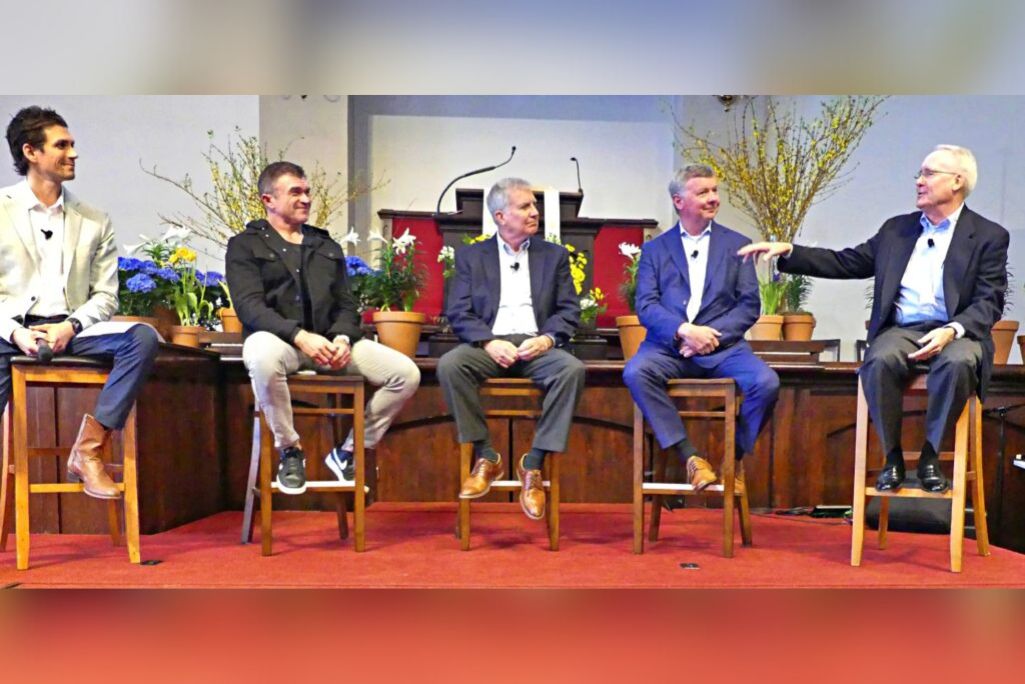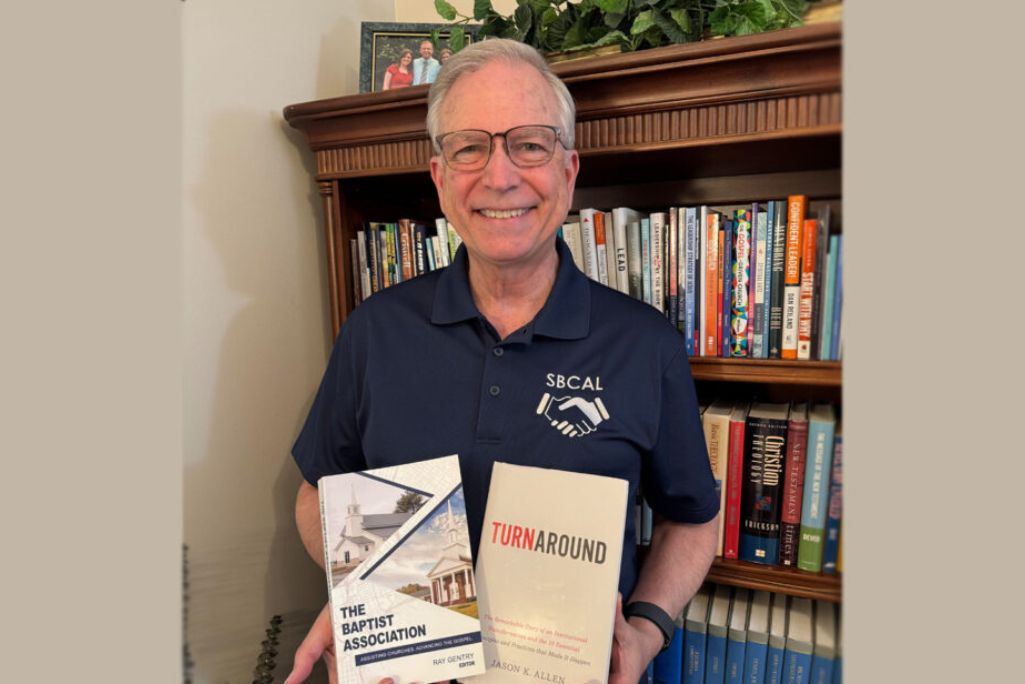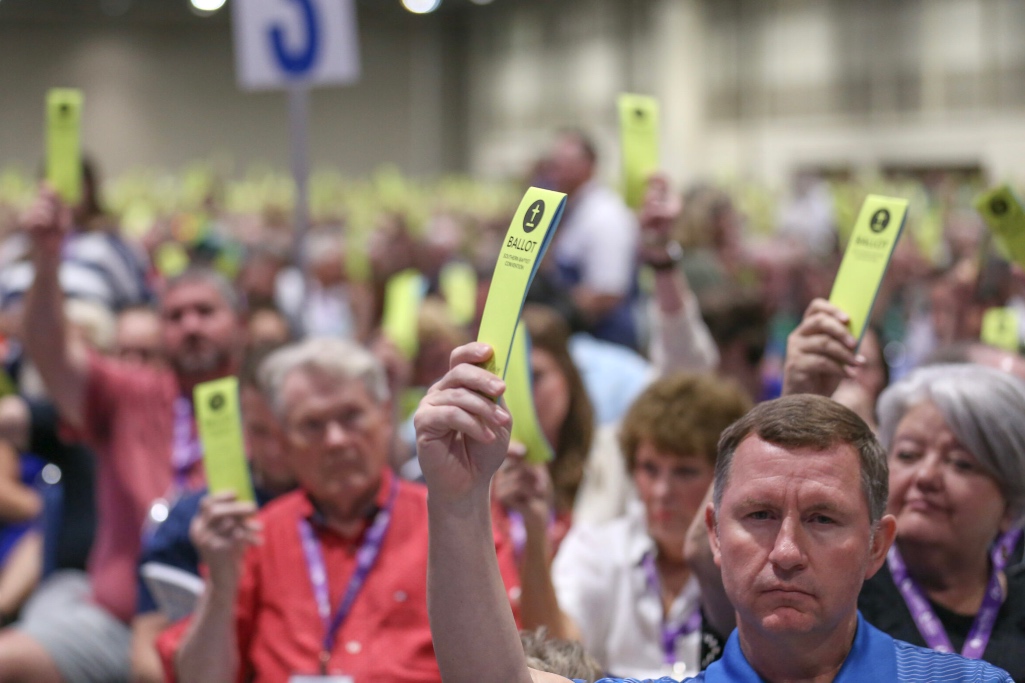
Associational Mission Strategist David Franklin, center, joined a panel of faith leaders on April 30 at Park Street Church in Boston to discuss faith's role in human flourishing.
CAMBRIDGE, Mass. (BP) — David Franklin is about as Georgia as you can get, from his drawl to his permanent smile as he makes his way among the churches in Bartow Baptist Association. As an associational mission strategist, he has developed a reputation for identifying needs and coming at them with a commonsense, biblical perspective.
Those qualities connected him with the local school system. After a highly successful literacy campaign, leaders asked him to help with a mental health crisis.
That caught the eye of a Harvard professor. Last month, Franklin sat on a stage among Ivy Leaguers, explaining how faith and concepts taught in Scripture lead to human flourishing.
“If you’re going to have human flourishing, you’ve got to have it at home, at work, at school and in faith,” Franklin told Baptist Press (BP) on May 20. “Harvard had been following what was happening in Bartow County.”
It began with Read to Grow, a program established among select elementary schools during the 2018-19 school year that enlisted more than 100 volunteers to read with children. Third-grade reading proficiency stood at 43.5% at the time, and — with the support of 67 local churches — the proficiency level has risen to 64.7%, Franklin said. The program eventually extended to every school in the Bartow Board of Education the following year.
“That’s historic,” he said. “If you move the needle three degrees in education, you’re big time. And because the volunteers had done such a good job, I was called to be involved in a meeting over the growing problem of suicide ideation.”
The superintendent’s concerns over student mental health had materialized in a middle school where counselors had identified 87 cases of children expressing suicidal thoughts or instances of self-harm. The response came in a peer counseling movement named Whisper and brought shout-worthy results. It eventually spread to all county schools and caught the attention of Atlanta media.
“It was so successful that the number of suicidal ideations fell to 30,” Franklin said. “The principal said it changed the school.”
Based on biblical values, Whisper was developed by David Ferguson, a former pastor who founded the Center for Relational Care and the Great Commandment Network.
Maybe chapters and verses weren’t being cited, explained Franklin, but Scripture was being lived out.
“We were having 250 kids using Bible verses without the street address,” he said. “They were just living it out.”
It also led to establishing bartowcares.com, which starts with the tagline: “Everybody has a story … & somebody cares.”
All of that got on Harvard’s radar. The university’s Human Flourishing Program collaborated with Baylor’s Institute of Studies of Religion to produce the Global Flourishing Study, a five-year, $43.4 million initiative that involved data from more than 200,000 participants across 22 countries.
Harvard Professor Tyler Vanderwheele identified four areas of human flourishing that must be addressed — at home, at work, at school and in faith. If people are to connect relationally, research showed, faith mattered.
On April 29, the day before he appeared on the panel, Franklin joined a group of ministers across 17 denominations to discuss the study on another panel. He told BP he had to repent of his preconceived notions about the level of Christian witness on campus.
“This study is important because Harvard has departments devoted to physical and emotional flourishing. Nobody has ever put them together, but this study does and you have Christians driving it,” he said. “The lost world, the academic world, cannot argue with it because this is Harvard’s research.”
Franklin will share his experiences at the Southern Baptist Convention Associational Leaders (SBCAL) meeting at The Adolphus Hotel in downtown Dallas in conjunction with the Southern Baptist Convention (SBC) annual meeting.
A culture of connectivity is also ready for a relational message, Franklin explained.
“We have an epidemic of loneliness in this country,” he said. “Fifty-six percent of Millennials say they’re lonely.”
“I’ve shared the gospel with more people in the last 18 months than I have in my entire life, and I was an evangelism guy at my church,” he said.
“You cannot have gratitude and anxiety at the same time. The best way to reduce anxiety is to be thankful. Philippians 4:8 tells us to focus on whatever is lovely. Places like Harvard are showing this to be true.”
(EDITOR’S NOTE — Scott Barkley is chief national correspondent for Baptist Press.)


